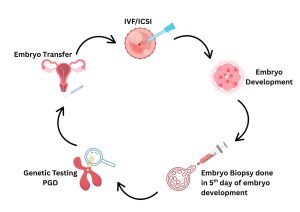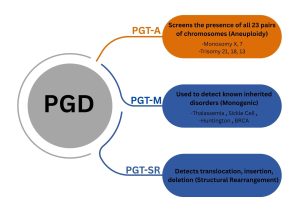All about Genetic Diagnosis
To give hopeful parents the best chance for a healthy baby, genetic diagnosis is often used to identify any hereditary diseases that may be carried by one or both parents. In recent times, thanks to modern science, couples now have access to advanced tools that help ensure the health of their future children. One of the most significant breakthroughs in reproductive medicine is Preimplantation Genetic Diagnosis (PGD), a powerful technique used during IVF treatment. Below we will speak about Preimplantation Genetic Diagnosis (PGD) in more detail, where embryos are genetically profiled before being implanted.
Why is PGD important?
Genetic diagnosis plays a crucial role in identifying hereditary diseases that might be silently carried by one or both parents. A human body contains 46 chromosomes: 23 pairs inherited equally from the maternal egg and paternal sperm. These chromosomes hold approximately 20,000 protein-coding genes, responsible for vital bodily functions. However, a single mutation in any of these genes can lead to a range of genetic disorder, such as cystic fibrosis, sickle cell anemia, Tay-Sachs disease, or Huntington’s disease. Many of these conditions may not present symptoms in the carriers, making them difficult to detect without proper testing.
What is PGD and How Does It Work?
Preimplantation Genetic Diagnosis (PGD) is a procedure that involves testing embryos for genetic abnormalities before they are implanted in the uterus. It is conducted as part of an IVF cycle, where eggs are retrieved from the ovaries, fertilized in a laboratory setting, and allowed to develop into embryos.
On the fifth or sixth day of development, when the embryo reaches the blastocyst stage, a few cells are carefully removed from the part of the embryo that will develop into the placenta—not the fetus itself. This technique ensures that PGD does not harm the embryo and remains a safe and reliable method of screening.
By analyzing the DNA of these cells, specialists can detect inherited genetic conditions and chromosomal abnormalities, allowing parents and doctors to choose the healthiest embryo for implantation. As a result, PGD significantly reduces the chances of passing on genetic diseases and increases the likelihood of a successful, healthy pregnancy.
There are 3 different types of tests performed on the embryo during IVF:
PGT-A
PGT-M
PGT-SR
Who Should Consider PGD?
PGD is not necessary for every IVF patient, but it is highly recommended for individuals or couples with higher risk factors. You may be a good candidate for PGD if you fall into any of the following categories:
-
Women over the age of 35: As maternal age increases, so does the risk of chromosomal abnormalities in embryos.
-
Couples with a family history of genetic disorders: If either partner is a known carrier of an inherited condition.
-
Those who have experienced multiple miscarriages: Especially when the cause is unknown or suspected to be genetic.
-
Couples with repeated IVF failure: PGD can help identify genetically viable embryos for transfer.
-
Parents who already have a child with a genetic condition: PGD offers a path to prevent recurrence in future pregnancies.
A Healthier Future with PGD
In the journey toward parenthood, knowledge is power. Preimplantation Genetic Diagnosis gives families peace of mind, knowing they have done everything possible to reduce the risk of passing on serious genetic conditions. As part of an IVF treatment, PGD is a powerful step forward in reproductive health, helping to ensure that the next generation starts life with the best possible chance.
If you’re considering IVF and are concerned about hereditary conditions, speak with your fertility specialist about whether PGD might be right for you.
For free consultation with our medical team, please contact us!


